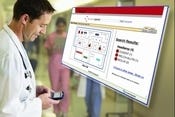Sprint, AirStrip Partner On Hospital TelehealthSprint, AirStrip Partner On Hospital Telehealth
Medical facilities will get financial and technical help building robust in-building mobile networks to transmit medical data using 4G handsets from Sprint.

Slideshow: Wireless Telehealth Brings Medical Help To Those In Need |
|---|
Mobile medical software developer AirStrip Technologies has joined forces with telecommunications company Sprint to transmit medical data over robust networks to the mobile devices of medical professionals.
Under the terms of the agreement announced Tuesday, AirStrip applications will be available on Sprint smartphones, like the HTC EVO 4G and soon the Samsung Epic 4G. The applications are Health Insurance Portability and Accountability Act (HIPAA) compliant and Food and Drug Administration cleared.
The companies are collaborating for a cost-effective, bundled offer that includes Sprint's clinical grade in-building coverage enhancement and AirStrip services for hospitals that agree to expand or extend an enterprise commitment to the Sprint network for employees.
According to AirStrip officials, the deal will help their business strategy on two fronts: first Sprint will assist hospitals with upfront costs to implement the technology needed to transmit data at high speeds, which AirStrip officials hope will accelerate adoption of its technology. Second, access to robust networks will allow AirStrip to broaden the features it offers to doctors, nurses, and other clinicians.
"Sprint is a committed partner offering to help relieve any fiscal concerns for customers looking to sign on with both Sprint and AirStrip," Bruce Brandes, chief sales officer at AirStrip Technologies told information. "Sprint will help offset some initial expenses to get AirStrip implemented quickly so hospitals won't have to wait due to fiscal constraints that don't offer room for unbudgeted projects."

Slideshow: RFID In Healthcare
Slideshow: RFID In Healthcare (click image for larger view and for full slideshow)
Brandes also said Sprint's infrastructure, in particular its 4G network, offers enormous promise for AirStrip's product development.
"With this faster, stronger network, AirStrip can now reconsider additional features that, in the past, may have been limited by bandwidth, speed, and functionality," Brandes said. "There are a number of options on the horizon to improve the AirStrip offering that are more feasible thanks to 4G. For example, the possibility of integrating face-to-face videoconferencing is something we'd like to explore, and with the 4G network these options are now in the realm of possibility in a way that they weren't in slower-speed networks."
AirStrip Technologies has developed remote patient monitoring applications that deliver real-time vital waveform and other critical patient data directly from hospital monitoring systems to mobile devices to enable healthcare providers to continually monitor vital signs wherever they are.
AirStrip executives also said the data is not stored on the device; it is hosted in the cloud. Therefore, if an HTC EVO 4G or hand-held device is lost or stolen, patient records and data remain safe.
Company officials said AirStrip maintains collaborative relationships with all partners, including AT&T and Verizon, while staying carrier agnostic.
"In this case, Sprint has stepped up its commitment to expanding the availability of AirStrip's solutions in healthcare. Coupled with Sprint's 4G network capabilities and their financial commitment to spur faster adoption of AirStrip solutions, we're pleased to be announcing this special partnership," Brandes added.
This month, other telecom companies revealed their plans for the competitive telehealth market. AT&T announced deals with eCardio Diagnostics and WellDoc as it builds on its mobile telehealth strategy. Verizon also announced this month that it will expand the Verizon Medical Data Exchange from a service that provided only transcriptionist-to-physician and physician-to-physician sharing of dictated notes to an exchange that now allows healthcare delivery organizations to share a broader range of digital records such as X-rays, blood tests, and other lab results.
About the Author
You May Also Like






